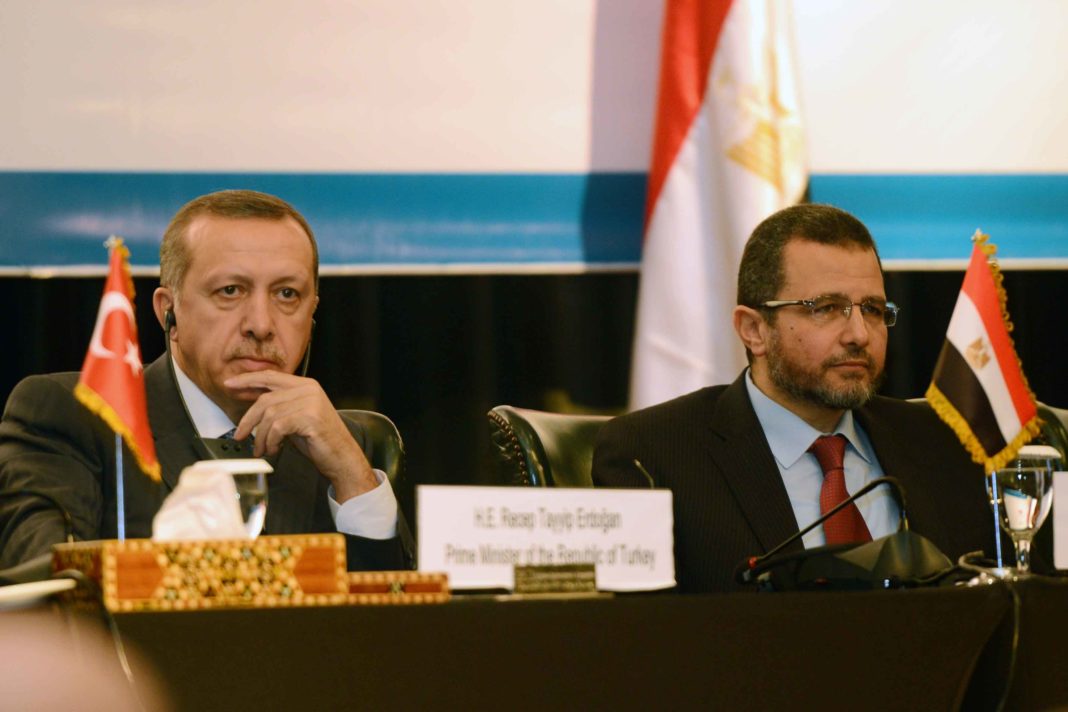« Although Ankara has secured several diplomatic strides by normalizing its relations with Saudi Arabia and the United Arab Emirates, rapprochement with Egypt still seems a challenging prospect » reports Fehim Taştekin in Al-Monitor.
Turkey’s efforts to turn a fresh leaf with its former Arab rivals have so far been fraught with U-turns and unilateral concessions from Ankara. Despite the recent thaws with Saudi Arabia and the United Arab Emirates, Egypt seems to be hesitant, and it remains unclear how much President Recep Tayyip Erdogan’s April 28 visit to Saudi Arabia help normalize relations with Cairo.
Saudi Arabia and Egypt have been two major Arab countries that were disgruntled by Ankara’s intrusive policies vis-a-vis the Arab world. Ankara’s strong support of the Muslim Brotherhood in the wake of the Arab Spring, its military and political alliance with Qatar and neo-Ottoman ambitions have been among the major contention points. Ankara’s latest diplomatic push to mend ties with Arab countries seems to be fueled by Turkey’s economic problems as Erdogan tries to improve his country’s economic outlook ahead of the 2023 presidential elections.
Indeed, the hug Erdogan gave to Crown Prince Mohammed bin Salman became possible only after three postponed visits and Ankara’s decision to suspend the trial over assassination of Saudi dissident Jamal Khashoggi in Istanbul.
The visit showed how the tables have turned against Erdogan, who once sought to make the crown prince pay the price for the assassination. Erdogan was greeted by the Jeddah governor at an airport on his arrival and sent off by deputy governor on his departure. Saudi media reports stressing that the visit request came from Ankara instead of Riyadh marred Erdogan’s image further. During his trip, Erdogan said he visited the country upon the Saudi King’s invitation.
The talks between Erdogan and the Crown Prince have yet to bear any concrete results, and Turkish public opinion seems to be focusing on what Ankara has given rather than what it has gained.
According to Saudi Arabia’s former chief of Intelligence Turki bin Faisal Al Saud, whose maternal grandmother was a Turk of ethnic Circassian descent, the rapprochement shows that Erdogan has acknowledged Ankara’s anti-Saudi policies didn’t do anyone, particularly Turkey, any good.
Meanwhile, Egypt seems to be the next country where Ankara is making a diplomatic push. On his return from Saudi Arabia, Erdogan said Turkey-Egypt ties hadn’t been discussed, but added that the ongoing low-level talks between the two countries’ officials could yield to highest level talks between the two capitals.
Tellingly, during Erdogan’s visit to Jeddah, Mekamelin TV, a Muslim Brotherhood-affiliated TV channel based in Istanbul, announced that it ceased its operations in Turkey and that it was transferring its headquarters to another country.
The announcement came almost a year after Brotherhood-affiliated TV channels based in Turkey were asked to stop criticizing Egypt President Abdel Fattah el-Sisi, and several programs by journalists critical of Sisi were suspended.
Although the Egyptian side welcomed the olive branch, Egyptian Foreign Minister Sameh Shoukry stressed Cairo’s demand for permanent closure of Muslim Brotherhood-affiliated TV channels.
Media reports also suggest that Ankara has been forcing some high-level Muslim Brotherhood figures to leave Turkey, by not extending their residence permits. A prominent Muslim Brotherhood activist, Yasser Al Umda, announced in April that the Turkish authorities asked him to leave Turkey after his video message calling on the Egyptian people to take to the streets against the Sisi administration. Yet, Ankara’s current position hardly allows it to show the door to the all Muslim Brotherhood members. Hence its goodwill gestures have remained confined to smaller steps.
The two rounds of talks between Turkish and Egyptian deputy foreign ministers last year have yet to secure a meeting at the foreign levels. And a potential meeting between Turkish and Egyptian presidents seems much more challenging than Erdogan’s meetings with Gulf leaders.
Turkey’s Foreign Minister Mevlut Cavusoglu announced in April that he and his Egyptian counterpart Shoukry would break fast together in Istanbul, only to back down from his announcement later on. “Currently there is no scheduled meeting, or at least no date has been set for a meeting.” Cavusoglu said. “If a mutual will towards fully normalizing our relations emerges, then it could be possible to reinstate ambassadors mutually again. » Diplomatic relations between Turkey and Egypt were downgraded to the level of charge d’affaires in 2013. For the first time since the downgrade, Ankara appointed an ambassador to fill the charge d’affaires position in Cairo, which is seen as another olive branch.
According to Egypt’s former deputy foreign minister Hassan Haridi, Cairo will remain reluctant to fully normalize diplomatic ties until Turkey cuts off all the Brotherhood-affiliated TV channels based in Turkey. Ali al Hafni, another former Egyptian diplomat, meanwhile, said that Turkey also needs to take additional confidence building measures before a full normalization. Similarly, Shoukry stressed last year year that Ankara needs to stop meddling in Egypt’s internal affairs and sponsoring hostile radical groups.
Hence, the normalization between Ankara and Cairo can hardly be as fast as the normalization with Saudi Arabia and other Gulf countries. Reconciliation between Qatar and the Gulf countries and Ankara’s suspension of the trial over Khashoggi’s murder have facilitated the Turkish-Saudi rapprochement. Yet, Ankara’s support of the Brotherhood and Turkish military presence in Libya remain as the major stumbling blocks before Ankara-Cairo normalization.
Al-Monitor, May 7, 2022, Fehim Taştekin, Photo/Mohamed Omar

